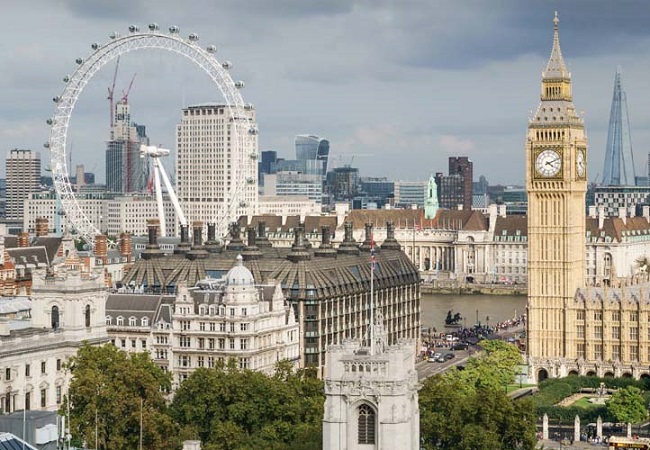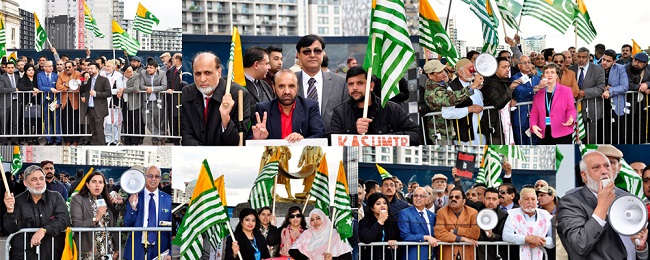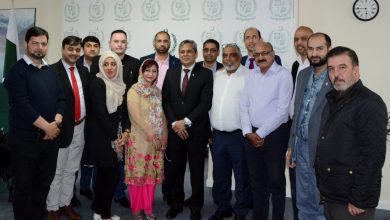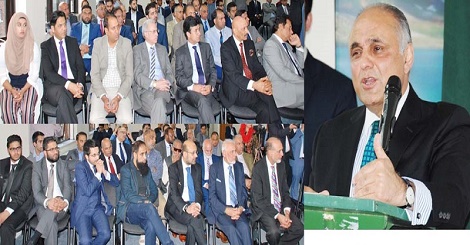Debbie Abrahams MP raises concerns about human rights violations in IIOJ&K in an official letter to UK PM Boris Johnson
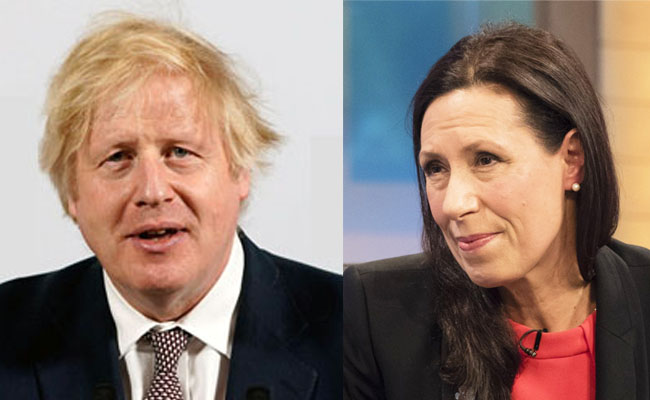
London: MP Debbie Abrahams Chair of the All-Party Parliamentary Kashmir Group (APPKG) raises concerns about the grave Human Rights Violations, Revocation of Special Status and illegal detentions in IIOJ&K in an official letter to UK PM Boris Johnson.
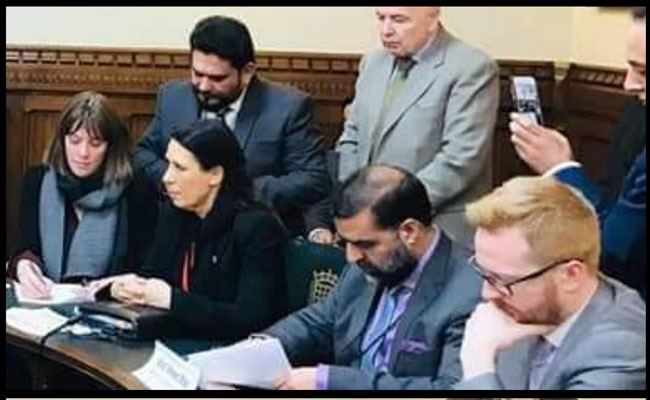
Young Kashmiri leaders: Altaf Ahmed Bhat President Jammu Kashmir Salvation Movement (JKSM) and Fahim Kayani President Tehreek e Kashmir UK appreciated the letter of MP Debbie Abrahams to UK PM Boris Johnson. They also said that the United Kingdom has to play a decisive role in Kashmir Dispute, while the debate in House of Commons and letter to PM Boris Johnson is a constructive step for Kashmir Freedom Movement Globally.
President JKSM & President TeK UK also appealed to UK PM Boris Johnson to raise Kashmir issue and grave Human Rights violations perpetrated against innocent and besiege Kashmiris since the Partition of the subcontinent and especially after the revocation of Article 370 & 35A.
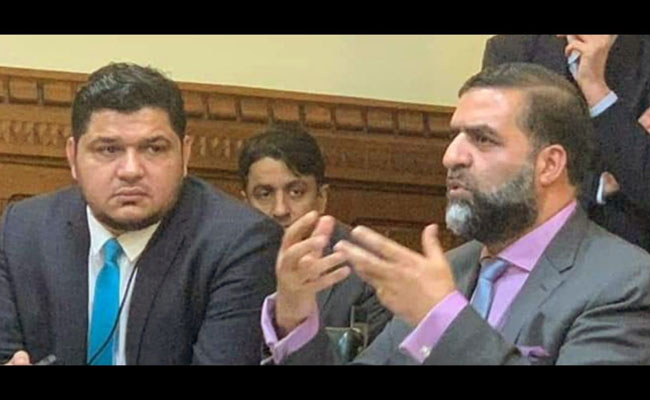
MP Debbie Abrahams in her letter said that APPKG consists of Parliamentarians from all faiths and Kashmiri, Indian and Pakistani heritage. Our focus has been on promoting human rights across all parts of Kashmir.
After the cancellation of PM Boris Johnson’s Visit to India due to COVID-19 B117, and Indian inclusion in G-7 Summit, she said that, While I fully support your endeavours to strengthen international relations which support jobs and investment across the UK, I need to make you aware of the strongly held views Parliamentarians of all political parties have regarding the primacy of human rights and that these cannot be compromised in any trade deal. The APPKG is particularly concerned about escalating violence across Indian-administered Kashmir (particularly Jammu and Kashmir) and most recently at the Line of Control.
Explaining the revocation of Special Status of IIOJ&K MP Debbie Abrahams said that You (PM UK) will be aware that the Indian Government revoked Article 370 and in particular Article 35A which had given special status and semi-autonomy to the people of the state of Jammu and Kashmir since partition. The Indian Government annulled Kashmir’s constitution split the area into two federal territories – Ladakh, and Jammu and Kashmir – and has imposed direct rule by the Indian Government from Delhi. Also, there has been a further erosion of inherited protections on land and jobs. A dozen petitions challenging the constitutionality of the move remain pending with India’s Supreme Court.
Many prominent Kashmiri politicians and public figures in the region have been detained with no recourse or under threat. Even children have been detained without charge. Activists say hundreds of people, including separatists, political moderates, civil society advocates and journalists remain in jail; it is unclear where some are being held. Accusations of torture by security forces have been widespread. Cell phone and internet access were blocked in the region and this remains patchy 17 months on. She added.
She further explained that Thousands, including civilians and those described as militants, have been killed in the violence. It has been reported that Indian army officers are often given rewards for the capture and killing of militants, either in financial pay-offs or promotions. Organisations such as Amnesty International and Human Rights Watch have raised concerns about human rights abuses in the region.
UN human rights experts last year called on India and the international community to take urgent action to address the alarming human rights situation in Jammu and Kashmir territory. The experts have also raised concerns with the Indian government about alleged arbitrary detention and torture and ill-treatment as well as the criminalisation of journalists covering the situation and the detention and deteriorating health of a high profile human rights lawyer.
Also,as the Covid-19 pandemic has hit, Kashmir’s tourism-reliant economy and civil society are now on the verge of collapse. In a year and a half, there’s been no new private investment in Kashmir, and police officials say that recruitment by militant groups is on the rise.
You will also be aware that in late September 2020, Amnesty International (Al) was forced to shut down operations In India citing a “witch hunt” against human rights organisation. Al India has had to lay off all their staff after the Indian government froze its bank accounts. This came after the group published two reports highly critical of the government’s human rights record including in Jammu and Kashmir. Amnesty has denied all allegations of financial misconduct and said it stood in full compliance with all applicable Indian and international laws. Significantly, no charges have been filed against the organisation.
Al said the move was the culmination of a two-year interrogation in which they were never told why investigations took place. In December 2020, the Karnataka high court allowed Al India to withdraw Rs 60 lakh from its bank accounts after rejecting the Indian Government’s Enforcement Directorate’s objection. However, this still amounts to only some 500,1, of what Al India owes its staff.
This comes at a time when human rights violations, particularly against India’s 200 million Muslims, are on the rise. You will be aware of the Citizenship Amendment Act enacted in December 2019 which is seen as discriminatory against Muslims and as a driver for these violations. According to FactChecker and reported in a recent New Yorker article there have been almost three hundred deaths recorded as hate crimes motivated by religion in the past decade almost all of them since Narendra Modi became Prime Minister. It has been reported that Hindu nationalist mobs have killed dozens of Muslim men. Unfortunately, the Indian Prime Minister says little or nothing to condemn such acts when they occur. She added.
She further added that, This crackdown on critics – including lawyers, activists, journalists and students – has also increased during the coronavirus pandemic. Courts are only partially functioning, and some protest gatherings have been banned. There has also been a particular focus from the Indian government on organisations which are claimed to be funded from overseas. This was the charge made against Amnesty International India and had previously frozen the bank accounts of Greenpeace. Indian authorities had previously raided the offices of human rights lawyers too.
Most recently you will have heard about the violence against peacefully protesting Punjab farmers, predominantly Sikhs, who fear the recent Farm Acts will drive them out of business.
I am sure you will agree with me that for the world’s largest democracy to be reported to be behaving in these ways is very alarming. MP Debbie Abraham added.
Given our key role in the International community, we believe it is essential that you, and the Government more widely, raise these very serious concerns directly in your on-going discussions with Prime Minister Modi and his Government. I also repeat the concerns raised by APPKG members that the protection of fundamental human rights must not be traded for economic gain, and would like your reassurance that any trade deal will make this explicit. As the UK Government embarks on a year for “Global Britain on the world stage” it is essential that we set out our stall with the rule of law and human rights at its heart.
I understand that President-elect Biden is set to have a strong focus on human rights more generally and specifically about U.S.-India relations. The President-elect’s office has already expressed concerns over the potentially adverse human rights impact of some of the Indian government’s recent policies, such as the Citizenship Amendment Act and the clampdown on political freedoms in Jammu and Kashmir.
MP Debbie Abrahams further added that I draw your attention to the warning that your own High Commission in Pakistan made to the APPKG delegation in February 2020 and which I reported to Lord Ahmad: the escalating tensions between India and Pakistan, both nuclear powers, makes Kashmir the number one security concern in the world. The recent conflict between India and China adds to this. I urge you to raise these matters with Prime Minister Modi in your ongoing discussions and when you visit India.

